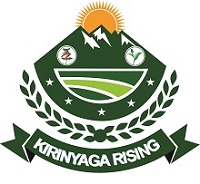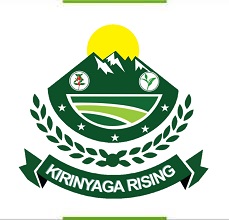Fish farmers supported by Governor Waiguru upbeat as harvesting starts
Kirinyaga farmers who were supported by Governor Anne Waiguru to undertake fish farming have started harvesting the first fruits as fish attain maturity. This comes in the wake of rising consumer demand for fish in Mt. Kenya region that saw the farmers fetch huge amount of money from the first harvest.
Fish farming and consumption, a practice considered cultural as a preserve for communities around Lake Victoria basin and the Coast region, is gradually being embraced by all thus pushing the demand high. This demand is what informed Waiguru to support selected self-help groups in construction of fish ponds and subsequent stocking with fingerlings to start the venture. The farmers were also given free fish feeds for seven months, the period of expected fish maturity and harvesting. Two of the groups harvested their fish yesterday and the catch was sold out immediately. Twenty community groups were selected after applying for funding by the County Government that has been assisting farmers to diversify on their agricultural activities with an aim increasing their income.
The governor said that the fish farming project is one of the components of Wezesha Kirinyaga Economic program that has been supporting farmers to diversify on their agricultural activities in order to increase their revenue streams. “Fish farming will provide alternative livelihoods and give direct support to women and youth who will be involved at various stages of the project value chain which include, cooking, selling and transportation of fish. Others will be employed at fish eateries which have now become very popular in our county”, said the governor.
Waiguru said though Kirinyaga is known for cash crops such as tea, coffee and rice, fish rearing is a new stream for farmers to diversify their income. “The project was also informed by the huge deficit of fish which makes Kenya import fish since lakes fishing cannot sustain the demand. As such half of all the fish produced in Kenya comes from aquaculture while the other half comes from ocean and lake fishing,” the governor said.
The beneficiaries have testified that integrating fish farming has turned out to be a game changer in their farming practice. “We are very happy that our fish is now mature and we have started making sales and getting some for our families to consume.” Said Caroline Wambui, a member of The Great Star Youth Group from Gichugu Constituency. She said that her youth group is very grateful to Governor Waiguru for initiating the program which she noted was going to empower the youth. She noted that they were given free fish pond liners, free fish feeds and all they had to do was to nurture the fish to maturity.
Elija Karari, who is the Chairman of Kiamurugu Tissue Bananas Group said that the 25-member group benefited from 1,600 fingerlings which they are currently harvesting and selling. He said that once they have sold the current harvest, they will use the proceeds to restock their fish pond and buy fish feeds and sustain the project on their own going forward. He said that fish farming compared to other farm activities is less time consuming and production cost is manageable. He thanked Governor Waiguru for the support which he will go a long way in uplifting the living standards of the farmers who have embraced the project.
Another member of the group, Susan Kagio, said that they will also plough back the profits to their group table banking initiative so as to expand their capital base hence make more money out of lending among the members. “We also want to introduce the fish project at the individual level even as we continue with the group project since we have now gained valuable experience on how to manage fish farming.” She said.
Fish mongers have opened shop in most of the major towns across the county while fish eateries have been opened in almost every street. At Kagio town, selling of cooked fish has become a lucrative business for both men and women and customers have to buy raw fish and wait on the queue for the vendors to deep fry for them. “The demand for fish in this town is very high, am surprised. I started it as a trial business but now am in it fully, people are coming in their numbers to buy cooked fish. The only problem is there the supply is low. We have to go for kilometers to Masinga dam or down river Sagana to get the fish,” said James Bundi, a fish seller in Kagio town.
Hellen Atago, another fish monger in the town says that fish business has enabled her meet her basic needs including educating her children. She is happy about Governor Waiguru’s initiative in up scaling local fish production. She said that getting fish from Masinga Dam or Naivasha has lately become an uphill task as a result of rising cost of fuel. She confirmed that demand for fish in the county is very high as more families incorporate fish in their diet. “People have discovered the value of consuming fish and those locally growing fish are getting ready market.” Said Atago.
Governor Waiguru said that her vision is to see Kirinyaga get a fair share of fishing potential given that it is endowed with favorable aquaculture conditions which include fresh water and ready market. She is working towards increasing annual fish production from the current 29.4 tons valued at Ksh. 12.8 million to 62 tons which will fetch the farmers around Ksh. 30 million per year.
After getting re-elected, Waiguru reiterated her support to farmers through expansion of Wezesha project to ensure that every household in the count is impacted. “As we are all aware, agriculture is the backbone of our county’s economy. Through our Wezesha Kirinyaga program, we have been implementing a robust program to increase agricultural productivity with an aim of putting more money in the pockets of our farmers,” she said.
Waiguru has over the years called upon the county residents to embrace routine consumption of fish as a way of boosting their health as well as growing the county’s economy. She said that consumption of excess red meat has been attributed to high prevalence of non-communicable diseases such as high blood pressure, diabetes and kidney diseases among the county residents noting that fish provides a good source of the recommended white meat.
The county was ranked number five during last year’s National Aquaculture Annual Stakeholders Review meeting held that was held in Kirinyaga. The forum brought together representatives of the national government and county governments’ departments of Agriculture, Livestock and Fisheries, fish farmers and other stakeholders. The ranking was based on implementation of the Aquaculture Business Development Program which is a collaboration of the county governments and the National Government.
Other projects that Kirinyaga County Government is supporting under Wezesha Kirinyaga program are poultry, dairy, avocado and tomato value chains as well as pig rearing, bee keeping and cultivation and value addition of traditional vegetables.



